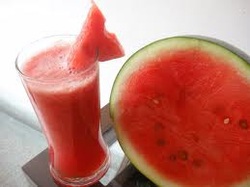
Tired of achy muscles after a workout or a long bike ride? Next time try drinking a glass of watermelon juice right before you exercise. Researchers in Spain published a study in the Journal of Agricultural and Food Chemistry that examined the potential benefit of drinking watermelon juice for sore muscle relief in athletes. Why watermelon? Watermelon has high levels of an uncommon amino acid, L-citrulline, that’s otherwise almost absent in natural foods. L-citrulline has antioxidant properties as well as the ability to generate nitric oxide, which plays a key role in heart health and improves athletic performance. According to Encarna Aguayo, lead author of the study, naturally high levels of L-citrulline makes watermelon juice an excellent option for athletes who want to improve their sports performance. L-Citrulline also speeds up removal of lactic acid, allowing for more intense training with faster recovery after each workout.
Aguayo and her colleagues wanted to find out if watermelon juice could function as a sports drink. First they wanted to determine the bioavailability of L-citrulline by testing how well our bodies can absorb L-citrulline. They measured absorption of L-citrulline by human colon cancer cells using liquefied watermelon pulp (juice from seedless watermelons) that was pasteurized or unpasteurized, and water spiked with the same concentration of synthetic L-citrulline (representing absorption when taking a citrulline supplement). They included pasteurized juice because pasteurization kills harmful pathogens and sometimes reduces absorption of bioactive compounds, reducing the food’s benefits. They found that the cells absorbed the most L-citrulline from the natural watermelon juice that was not pasteurized, nearly 19%, while the cells absorbed less L-citrulline from the pasteurized and spiked samples, only about 13% and 12% respectively, which indicates that our bodies absorb the most L-citrulline from natural watermelon juice. In other words, we get more benefit from natural watermelon juice than supplements in the case of L-citrulline, which is no surprise because the L-citrulline in watermelon juice has the added benefit of all the other phytochemicals that are missing from a supplement or may have been altered by pasteurization. Another factor in bioavailability of a nutrient is the speed of absorption of the nutrient. Faster absorption of a nutrient helps that nutrient avoid competition with other nutrients and enhances beneficial effects of the nutrient. Aguayo and her colleagues found that the L-citrulline was absorbed most quickly from natural, unpasteurized watermelon juice.
The next part of the study was to find out if drinking watermelon juice would actually reduce soreness after exercising. They recruited seven men who were not competitive athletes, but played sports regularly, and tested each man once on three separate days. The test consisted of cycling on a stationary bicycle for 11 minutes and alternating between periods of intense pedaling and rest. Each man was given a half liter to drink prior to exercising of either natural watermelon juice, natural watermelon juice enriched with L-citrulline, or a placebo of a similar-looking and tasting pink fruity drink with neither watermelon nor L-citrulline. The effect of each drink was tested on each participant, and none of the subjects knew which version of the drink they were given for either of their three tests. Interestingly, when the participants drank either watermelon drink (natural watermelon or enhanced natural watermelon), they reported little or no muscle soreness the next day. However, when the participants drank the placebo drink, they reported feeling sore the next day. This indicates that the natural levels of L-citrulline in watermelon is sufficient to reduce or eliminate muscle soreness, and that there is no added benefit to enriching the L-citrulline that is naturally present in watermelon juice.
So next time you plan to exert yourself, try drinking a refreshing glass of pureed watermelon juice right before doing the activity and you may not have to pay for it the next day! I’m going to try it!
Aguayo and her colleagues wanted to find out if watermelon juice could function as a sports drink. First they wanted to determine the bioavailability of L-citrulline by testing how well our bodies can absorb L-citrulline. They measured absorption of L-citrulline by human colon cancer cells using liquefied watermelon pulp (juice from seedless watermelons) that was pasteurized or unpasteurized, and water spiked with the same concentration of synthetic L-citrulline (representing absorption when taking a citrulline supplement). They included pasteurized juice because pasteurization kills harmful pathogens and sometimes reduces absorption of bioactive compounds, reducing the food’s benefits. They found that the cells absorbed the most L-citrulline from the natural watermelon juice that was not pasteurized, nearly 19%, while the cells absorbed less L-citrulline from the pasteurized and spiked samples, only about 13% and 12% respectively, which indicates that our bodies absorb the most L-citrulline from natural watermelon juice. In other words, we get more benefit from natural watermelon juice than supplements in the case of L-citrulline, which is no surprise because the L-citrulline in watermelon juice has the added benefit of all the other phytochemicals that are missing from a supplement or may have been altered by pasteurization. Another factor in bioavailability of a nutrient is the speed of absorption of the nutrient. Faster absorption of a nutrient helps that nutrient avoid competition with other nutrients and enhances beneficial effects of the nutrient. Aguayo and her colleagues found that the L-citrulline was absorbed most quickly from natural, unpasteurized watermelon juice.
The next part of the study was to find out if drinking watermelon juice would actually reduce soreness after exercising. They recruited seven men who were not competitive athletes, but played sports regularly, and tested each man once on three separate days. The test consisted of cycling on a stationary bicycle for 11 minutes and alternating between periods of intense pedaling and rest. Each man was given a half liter to drink prior to exercising of either natural watermelon juice, natural watermelon juice enriched with L-citrulline, or a placebo of a similar-looking and tasting pink fruity drink with neither watermelon nor L-citrulline. The effect of each drink was tested on each participant, and none of the subjects knew which version of the drink they were given for either of their three tests. Interestingly, when the participants drank either watermelon drink (natural watermelon or enhanced natural watermelon), they reported little or no muscle soreness the next day. However, when the participants drank the placebo drink, they reported feeling sore the next day. This indicates that the natural levels of L-citrulline in watermelon is sufficient to reduce or eliminate muscle soreness, and that there is no added benefit to enriching the L-citrulline that is naturally present in watermelon juice.
So next time you plan to exert yourself, try drinking a refreshing glass of pureed watermelon juice right before doing the activity and you may not have to pay for it the next day! I’m going to try it!



 RSS Feed
RSS Feed